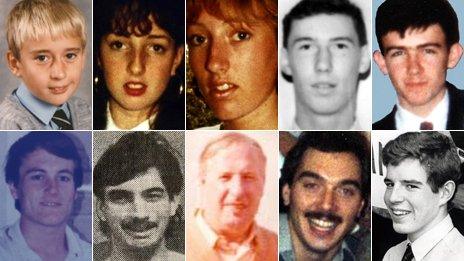Hillsborough inquests: Trevor Hicks 'tried to save daughters'
- Published
CCTV shows the Hicks family at Hillsborough, as Judith Moritz reports
A father who lost two daughters at the Hillsborough disaster has described how he gave them mouth-to-mouth resuscitation as they lay unconscious.
Trevor Hicks told an inquest jury how he moved back and forth between Sarah, 19, and her 15-year-old sister Vicki.
He also said he felt "dreadful" after choosing to ride to hospital with one of them while leaving the other behind.
Ninety-six fans were fatally injured in a crush at the 1989 Liverpool against Nottingham Forest FA Cup semi-final.
Bodies 'laid down'
Giving evidence at the new inquests into the disaster, Mr Hicks said he stood in a different section of the Leppings Lane terraces from his daughters.
His wife Jenni had a seat in the adjoining North Stand, he said.
In a statement, Mr Hicks said he saw the "limp form of [his] youngest daughter Victoria being passed over the barrier".
Both girls were eventually laid down next to each other on the pitch, the inquests heard.
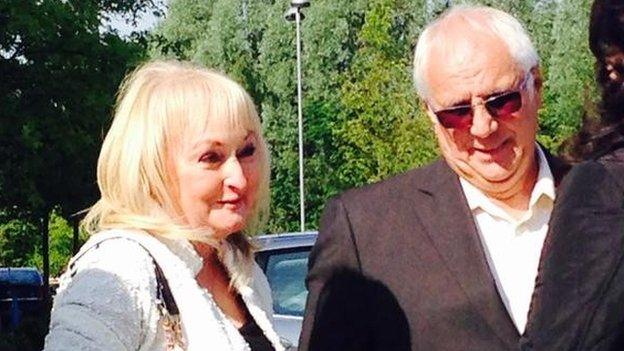
Jenni and Trevor Hicks were in different stands on the day of the disaster
Mr Hicks described how he was helped by others as he started trying to resuscitate them, drawing on first aid training he had received as an engineer.
He moved from one daughter to the other, shouting their names and asking for help, the court heard.
"I was doing what I thought was best. I was calling for assistance," he said.
"I've also been taught that one of the last things that goes is your hearing so I was calling their names in the hope that, you know, they would know we were there."
Footage timed at about 15:35 BST - 35 minutes after the match kicked off - showed Mr Hicks with his daughters and a group of helpers at the Leppings Lane end.
He said: "If it seemed that somebody knew what they were doing and were doing a better job, I was more than happy to let them.
"It sounds a bit selfish but I wanted to get help for my girls."
Mr Hicks said neither Sarah nor Vicki showed any "signs of life" on the pitch, but everyone was working with a "positive attitude".
He added: "As far as I was concerned, they hadn't gone. I was going to do everything possible and everyone else seemed to be doing that. If they had a chance, they were going to get it."

Who were the 96 victims?
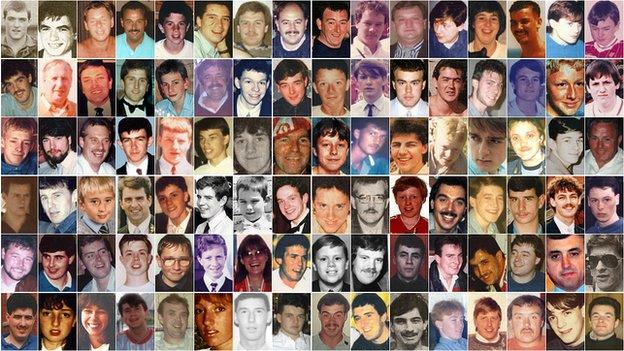
BBC News: Profiles of all those who died

He and a police officer, Peter McGuinness, eventually carried Vicki into an ambulance.
There was only room on board for one of his daughters and Mr Hicks had to make the "very difficult decision" to travel with his youngest and leave Sarah behind.
He saw one ambulance arrive and expected more to follow.
He said: "We thought that was the first of a fleet. You know, you expect something like that when there's a major incident going on.
"I felt dreadful. I had no choice - I appreciate that - but it doesn't stop you feeling dreadful about it. I knew there was a medic with Sarah at that time."
The court has heard that there were two other casualties placed into the same ambulance, which left the stadium at about 15:39 BST.
'Extreme distress'
Vicki continued to receive CPR as they travelled to the Northern General Hospital in Sheffield.
But Mr Hicks said he and PC McGuinness had put Vicki into the ambulance the "wrong way around", meaning that she could not receive oxygen while on board.
"We were all of the opinion that she had a chance," he said.

At the scene: Ben Schofield, BBC Radio Merseyside
Trevor Hicks gave what was times graphic and distressing evidence of the efforts he went to, to try and save his daughters, Sarah and Victoria.
He described moving from sister to sister trying out some kind of resuscitation and shouting out their names then marshalling others to help.
Mr Hicks said it "sounds selfish" but he just wanted people to help his daughters.
He talked of feeling dreadful at leaving his eldest daughter Sarah to go in the ambulance with Victoria and said he has suffered post traumatic stress disorder linked in parts to that ambulance journey.
Outside court he spoke about how difficult it was 26 years on from the disaster and said he was a "chipped cup" but in the same position as everyone else who had lost family in the disaster in having to deal with horrible details about their loved ones.

At one point he said that he and the ambulanceman on board, Tony Edwards, felt a pulse.
Medics at the hospital continued to work on Vicki for "10 or 15 minutes" but eventually formally pronounced her dead.
Mr Hicks earlier described how he had repeatedly called out to police officers after realising his daughters were in distress.
"I had obviously been seeing what was going on for some time. I was calling up to the police to do something about it," he said. "I had got a good view. It was clear that there were extreme circumstances.
"I knew roughly where they were. I was looking down - I could see that there were people in extreme distress. Clearly the attitude from the police officer was not going anywhere and so we carried on shouting up at them for a few minutes, probably."
The inquests, sitting in Warrington, Cheshire, continue.
- Published15 June 2015
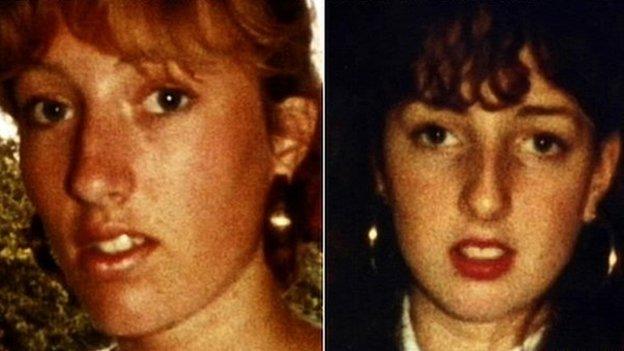
- Published13 October 2014
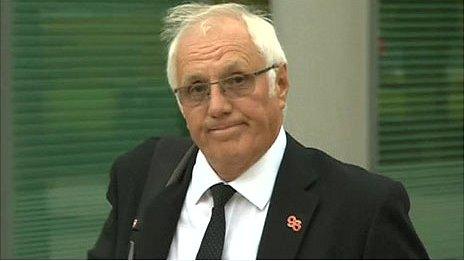
- Published10 April 2014
